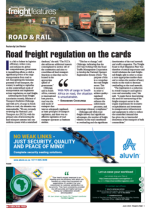As the number of vehicles on the roads continues to rise, the need for skilled and experienced drivers has become increasingly important.At this year's Road Freight Association conference, experts stressed the importance of comprehensive driver training programmes for heavy vehicles to ensure road safety and minimise risks associated with operating these vehicles.Eugene Herbert, CEO of MasterDrive, a driver training company, said research had revealed that a significant amount of driving experience was necessary for a driver to be considered skilled and competent on the roads.According to the study, drivers must have completed at least 160 000 kilometres, before being deemed experienced. This equates to an average of 3 000 km per month, suggesting that it takes around five years of consistent driving before a driver can be considered experienced.However, when it comes to commercial drivers, the numbers are likely to be even higher. Considering the additional demands and complexities of operating commercial vehicles, it is estimated that double the amount of experience is required to handle the job competently."The issue of inexperienced drivers is a growing concern, and it exacerbates the problems on our roads," said Herbert. "Simply going through the mechanics of driving a vehicle is not enough. The behavioural aspect and the decision-making skills of the person behind the wheel differentiate a good driver from an inexperienced one."From a training point of view, we have identified what sets experienced drivers apart. It is the ability to make executive decisions on the road. Inexperienced drivers lack the necessary judgement and decision-making skills, which can lead to dangerous situations."Herbert emphasised the need for behavioural changes in driver training programmes to address this issue. "It is crucial to go beyond teaching the technical aspects of driving and focus on developing the decision-making abilities of drivers," he said.Comparing statistics between the United States (US) and South Africa, forensic investigator Stan Bezuidenhout highlighted the need for change. "We have 13 million registered vehicles compared to the 282 billion in the US. Here we have 389 000 heavy trucks on the roads, while in the US, they have 168 million. In South Africa, however, we have 10 600 crashes yearly compared to the US’s 39 000. In the US 42 000 fatalities occur compared to 12 500 locally."However, Bezuidenhout said the US statistics indicated that 97% of occupants killed in crashes involving heavy vehicles were fatalities of third parties. "That is a statistic we cannot ignore. While our driving focus has always been inwardly directed in South Africa, the time has come for us to look outward."He said the most significant contributors to accidents locally were still fatigue, speeding and distracted driving.

